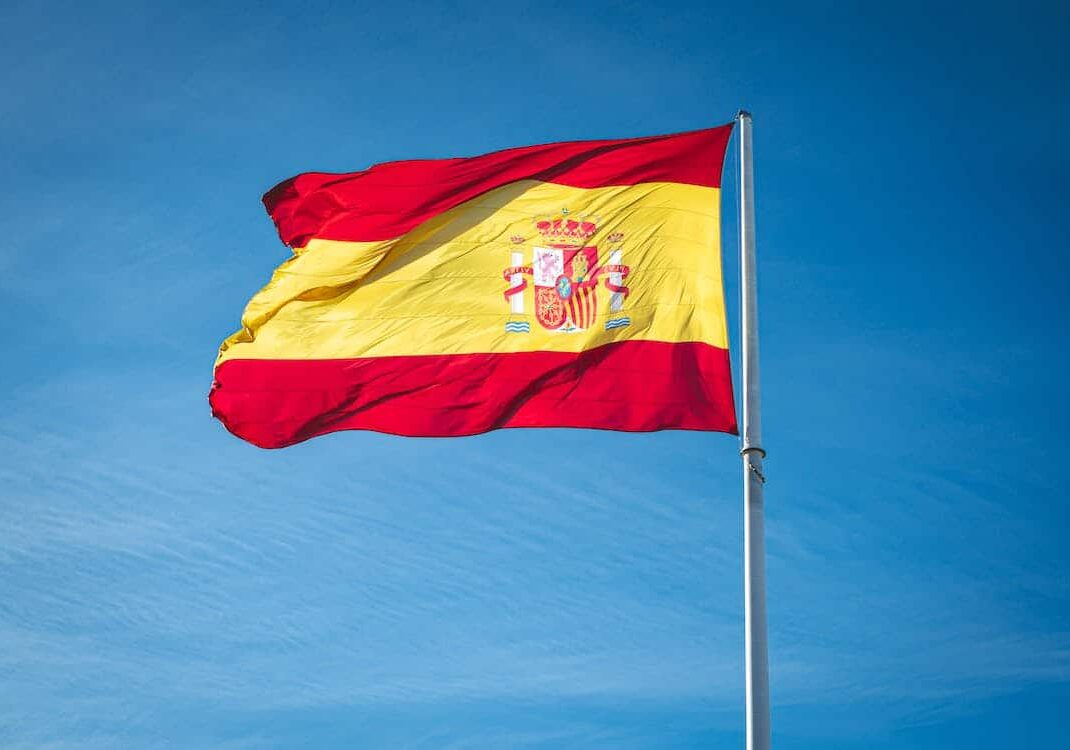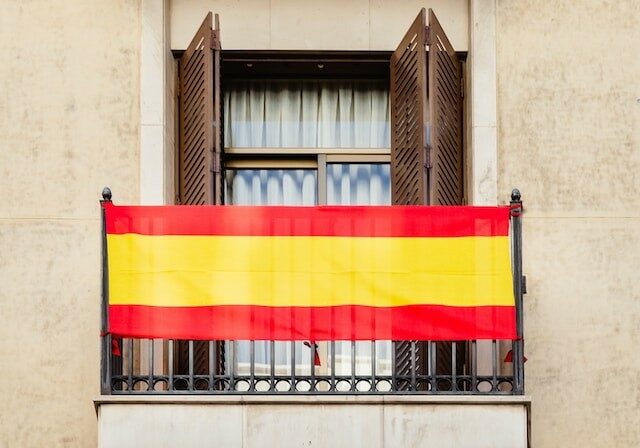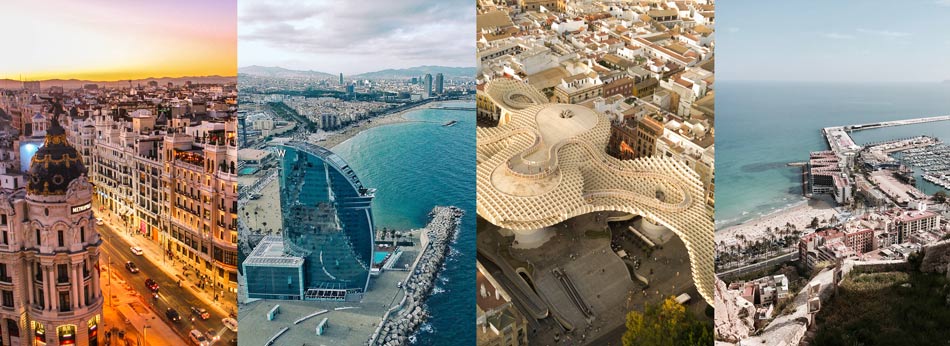
This guide will explore the Spanish lifestyle for expat retirees, covering the cost of living and highlighting Spain’s top cities for retirement. We’ll also explain how to retire in Spain through immigration programs, such as the Spain Golden Visa and the Spain Non-lucrative Visa.
Here’s what you’ll find in this article:
- The top visas for retiring in Spain
- How much money do you need to retire in Spain?
- The best cities to retire
- Spain taxes for retirees, and more!
Why Retire in Spain?

In 2023, Spain was the 8th safest nation in Europe for violent crime. While violent crime is uncommon, petty crimes like pickpocketing and theft, especially in tourist areas and large cities like Barcelona and Madrid, are more prevalent.
If you have a valid passport for the EU, you can easily travel anywhere in Europe, as Spain is well-connected with other countries via airplanes, buses, and trains. There are over 100 countries that don’t require a visa for Spanish passport holders, giving you access to a large part of the globe without hesitation.
The cost of living index is an important tool for comparing the prices of consumer goods and services across different locations. It covers categories such as groceries, dining out, transportation, utilities, and rent, providing insights into the affordability of essential items.
Madrid, the capital of Spain, offers a unique combination of cultural richness, historical heritage, and modern amenities, making it an attractive destination for residents and expatriates.
Housing is a significant part of living expenses in Madrid. The average monthly rent for a one-bed apartment in the city is approximately €1,300; in less central areas, it’s around €1,000.
Larger families looking for three-bedroom apartments would find options in the city, averaging €2,700 monthly and €1,600 in the suburbs. The purchase price per square feet reflects a similar urban-rural divide, costing about €550 in the city and €337 on the outskirts.
The Benefits of Retiring in Spain

Desirable climate: Popular retirement destinations in Spain like the Costa Blanca and Costa del Sol offer a warm and calm Mediterranean climate. Spain sees sunshine most of the year and experiences less average rainfall than European countries like Germany, France, and the UK.
Laid-back lifestyle: Spanish people are recognized for their peaceful and relaxed pace of living, which can be a nice change for retirees who have lived in a fast-paced and demanding atmosphere during their working life. The lifestyle in Spain plays a significant role in ranking as one of the world’s healthiest countries. It’s important to note that while cities like Barcelona and Sevilla are laid-back, more rural areas offer a much slower paced, relaxed lifestyle and better consumer prices.
Rich culture: Spain’s rich cultural history has littered the country with gorgeous buildings, world-class museums, and a thriving arts scene, forming a collage of cultural treasures that captivate visitors from around the globe. From the awe-inspiring architecture of Gaudi in Barcelona to the magnificent Alhambra in Granada, each city and region boasts its unique architectural marvels.
Renowned gastronomy: Spanish cuisine needs no introduction, as it is famous worldwide for its rich and diverse flavors. From the iconic paella of Valencia to the delicious tapas found throughout the country, Spain offers a culinary experience like no other. Fresh, locally sourced ingredients in Spanish food are a hallmark of Spanish cooking, resulting in dishes that burst with flavor and authenticity.
Low cost of living: Unlike many other Western European nations, numerous Northern and Southern Spain regions offer affordable living costs, particularly for expat retirees earning a foreign income through investments or a pension. Even in larger cities, the Spain cost of living is comparatively cheaper than in big cities like New York City, Paris, Sydney, and London.
Access to healthcare: Senior permanent residents and citizens living in Spain can access public healthcare in the country’s high-quality public healthcare system, including subsidized prescriptions and medication. Additionally, foreign nationals with temporary residency can opt for the nationalized insurance plan, Convenio Especial, or buy private health insurance with affordable premiums for senior citizens.
Gorgeous natural landscapes: Spain has some of Europe’s most attractive natural landscapes, from the lovely beaches of the Costa del Sol on the Mediterranean Sea to the rocky Pyrenees of the Iberian Peninsula. This also offers diverse living options among the varying lifestyle preferences of expats.
Favorable tax rates: Spain isn’t among the lowest tax countries; however, Spain provides a favorable financial environment for retirees who wish to remain tax efficient. Taxes in Spain vary based on a range of factors including whether you are a resident of the country, if your home country has a double taxation treaty with Spain, and the type of pension your receive. It’s important to understand what taxes apply to you. Speaking with a financial advisor or tax expert is recommended.
Who Can Retire in Spain?
EU Citizens
Spain is a European Union member state. This means retirement in Spain for EU citizens is straightforward. With EU citizenship, there’s no requirement for a visa or residence permit to live, work, study, or retire in Spain.
EU nationals need only to formalize their stay in Spain at Central Register of Foreigners of Spain (Registro Central de Extranjeros, or RCE) in order to receive a Foreigner Identity Number (NIE).
Non-EU Citizens
Two visa options are available to non-EU nationals: A Long-Stay Visa (Visado Nacional) and a Residence Visa (Visado Residencia). For a simple explanation, a Long-Stay Visa is required for periods of stay beyond the 90 days granted by a tourist visa, with a limit of one year before renewal. A Residence Visa is for stays exceeding one year.
How to Retire in Spain: Visas and Residence Permits
The residence option a non-EU citizen looking to retire in Spain should choose depends on whether they intend to live in the country temporarily or permanently. Most non-EU citizens, including British nationals, choose long-term visas that lead to permanent residency. The two most common visas include the Spanish Non-lucrative Visa and Spain Golden Visa and you can choose the specific visa that suits you.
Spain Golden Visa
The Golden Visa program is an immigrant investment program allowing non-EU nationals to gain a long-term renewable residence permit by making a financial investment in the Spanish economy. The application involves investing a minimum of €500,000 through investment options like real estate purchases, bank deposits, or starting a Spanish company that creates jobs for citizens. The visa is initially valid for two years and renewable continuously every three years.
Find more details about the Spain Golden Visa in this article: Golden Visa Spain – The Ultimate Guide by Experts.
The minimum requirements for a Spain Golden Visa are:
- Be at least 18 years old
- Make a significant investment and provide correct bank statements proving the investment
- Have a clean criminal record and a valid passport
- Not on the list of Spain’s undesirable people
- Have private health insurance and an official health certificate
- Not previously refused entry to the Schengen Zone or no refused visas
- Have enough financial means to support themselves
Important to note: The law terminating Spain’s Golden Visa program was published on January 3, 2025. It will take effect on April 3, 2025. After this date, new applications for the Spanish Golden Visa will no longer be accepted.
Spain Non-lucrative Visa
Also known as the Retirement Visa, the Spain Non-Lucrative Visa is designed for individuals with passive incomes, particularly senior citizens who receive social security payments or pensions.
For the specific retirement visa application, foreigners must prove they have the financial means to support themselves while living in Spain without engaging in work or professional activities. They can demonstrate this by showing they earn a passive income from foreign sources. As of 2024, the minimum income to retire in Spain is €2,400 per month or an annual income of about €29,000.
After successful renewal and five years of residency, both the Non-lucrative Visa and Spain Golden Visa grant a pathway to obtain a permanent residence permit. With an additional five years of residency, individuals can qualify for Spanish citizenship, provided they fulfill standard criteria such as no extended stays outside the country, the ability to speak Spanish, and an understanding of Spanish customs and traditions.
The minimum requirements for the Spain Non-lucrative visa are:
- Have an income or savings enough to live in Spain without the need to look for work
- Obtain private health insurance
- Clean criminal record certificate
- Medical certificate
Keep in mind that a Non-lucrative visa lasts for one year which you can renew. However, you need to remain in Spain for at least 183 days per year to remain within the regulatory requirements.
5 Best Places to Retire in Spain
Spain has fantastic cities in which to live and retire. Eventually, it comes down to your preferences and lifestyle choice in terms of location — the seaside, countryside, mountains — and the size of the town’s local population.
Whether you want to enjoy the stunning Mediterranean coast or soak in the Spanish culture, here’s a roundup of the best places to live in Spain.
1. Madrid
If you want to live in a big city, Spanish cities like Madrid and Barcelona are your go-to places. Madrid, in particular, has the best infrastructure and services in the country, making it easy to navigate without owning a vehicle. The city is dynamic, offering a diverse lifestyle for retiring expats of all demographics. There are plenty of excellent restaurants and cafes, and cultural activities take place throughout the year due to the warm weather.
2. Barcelona
It’s hard to mention the best places to retire in Spain without putting Barcelona on the list. While it’s the second-largest city in Spain, it’s the most famous. The city’s culture, creativity, and vibrant colors will captivate your heart as soon as you arrive. You’ll be awestruck by the city’s incredible tourist attractions, such as the La Sagrada Familia, Barri Gotic, and the Ramblas. Furthermore, Barcelona’s popularity has led to the emergence of a large expat community.
3. Seville
Seville might not be first on the list in terms of attractions or cultural events. Still, the city offers an authentic Spanish experience, and its affordable cost of living is one of its biggest selling points. Many retirees are drawn to Spain’s culture and slower pace of living. However, if you’re goal is to reduce living costs, you can rent an apartment in Seville for around €800 per month, and groceries are also cheaper than in Spain’s biggest cities.
4. Alicante
The Costa Blanca is frequently thrown around in conversations about Spain’s best cities to live in, and Alicante is a shining gem in this coastal region. With its stunning beaches and demonstration of the best of Spain’s warm weather, Alicante stands as a prime contender for those seeking an exceptional quality of life in Spain for retirees. The city boasts a vibrant expat community, ensuring newcomers feel welcome and integrated into the local culture. If you want to live elsewhere on the Costa Blanca, your other options include Elche, Benidorm, and Altea.
5. Marbella
Located on the Costa del Sol, Marbella is perfect for all those who have obtained a Spain retirement visa. Not only is this region packed with warm and welcoming locals and many expats, but it also has beautiful beaches, has lower cost of living, and you can live at a slower pace. It’s one of the most charming towns in Spain with its delicious cuisine and inexpensive restaurants, and you can live there comfortably. On top of that, Marbella boasts mild winters and you’ll never run out of things to do there.
How Much Does It Cost to Retire in Spain?
The overall cost of living and prices in Spain tend to be lower than other countries in the European Union. You can live comfortably in Spain with a monthly budget of about $1,500 to $2,000. And the cost of living a good life can be less or more, depending on where you decide to live.
Rental prices
While rental prices vary significantly in Spain, the cost of rent is reasonable compared to many other developed nations. In Madrid, for example, a one-bedroom apartment in the city center costs around €1,300 per month, and €2,200 would secure a three-bedroom apartment.
If you move beyond the city center, one-bedroom apartments can be as low as €900, with an average price of €1,000, a stark contrast to comparable cities like New York where the average cost of a one-bedroom apartment outside the center would command an average rent of €2,900.
Rental prices can be reduced even further by relocating to cheaper, less populated cities. For example, in a Spanish city like Seville, retirees can expect to pay an average monthly rent of €900 for a one-bedroom apartment, with prices going as low as €650.
Property prices
Purchasing property in Spain is a practical financial decision for many retirees considering retiring in Spain. There are no limitations on foreigners buying Spanish houses, and the country has become a popular property investment destination as the average house prices are considerably lower than in the US, the UK, and other countries in the European Union, like Germany and France.
Additionally, real estate investments exceeding €500,000 can qualify foreign retirees for the Spanish Golden Visa in order to gain a residence permit. Maintaining the acquisition also allows buyers to obtain a permanent residence visa after five years.
Spain witnessed a substantial real estate market downfall in the 2008 to 2009 financial year. However, it has steadily risen since then, with a growing number of foreigners looking to retire in Spain entering its property market.
According to Statista, the below prices per square meter reflect the average cost of real estate in popular Spanish regions:
- Balearic Islands: €3,353 per square meter
- Madrid: €2,967 per square meter
- Catalonia: €2,317 per square meter
- Basque Country: €2,706 per square meter
- Andalusia: €1,768 per square meter
- Valencia region: €1,487 per square meter
Cost of groceries
The cost of everyday groceries in Spain is considerably lower than in the US, at around 77 percent cheaper. With the nation being a significant exporter of European fruits and vegetables, you will undoubtedly be able to find fresh produce for very low prices. Here are some price comparisons of typical groceries:
Product | Price |
Milk | €1.04 |
Eggs (12) | €2.53 |
Chicken (1kg) | €7.14 |
Meat (1kg) | €13.53 |
Cheese | €12.13 |
Wine (mid-range) | €5.00 |
Domestic beer | €1.07 |
Restaurant Prices
Spain’s world-renowned cuisine makes dining out delightful and more budget-friendly than the US and many Western European nations. You can find high-quality meals at very affordable prices in many restaurants nationwide, and it is common practice to use fresh ingredients in Spanish restaurants. There are plenty of options for those who enjoy evenings out across most Spanish cities. Here are the average restaurant prices in Spain:
Product | Price |
Meal for one (inexpensive restaurant) | €13 |
Meal for two (mid-range restaurant) | €50 |
Utility prices
Most of us have experienced a rise in utility costs; however, prices in Spain remain relatively low. For an 85m² apartment, you can expect to pay about €130 per month for essential utilities, including gas, electricity, and water. The price for high-speed internet ranges from €25 to €50 monthly.
Public transportation
Spain’s excellent public transport system offers bus, metro, and train lines in major cities like Madrid and Barcelona, and Valencia, Spain’s third-largest city. The transit covers city centers to municipalities on the outskirts. A one-way ticket costs just €1.50 on average, and the average cost of a monthly pass is cheap at €30.
Owning a Car in Spain
Metropolitan hubs such as Madrid and Barcelona boast extensive public transportation networks, reducing the need for a personal vehicle. Additionally, parking has become increasingly limited in major cities in Spain and throughout Europe. However, retiring somewhere in the suburbs or a more rural area might mean owning a car is more convenient.
The average price of a vehicle follows the EU standard, with a Volkswagen Golf 1.4 90 KW Trendline or equivalent costing about €33,000. Fuel prices are relatively low by European standards at €1.59 per liter compared to €1.75 in the UK and €1.76 in Germany.
Spanish Healthcare
Spain’s healthcare system is ranked among the world’s best. It is free and accessible to citizens and permanent residents. Spanish hospitals and health centers offer excellent care and services.
Spain provides a nationalized medical insurance service for temporary residents called Convenio Especial, which contributes to the country’s social security system. The cost is €60 for retires under 65 and €157 for retires over 65.
Private health insurance is available for retirees who value prompt treatment and advanced healthcare services, giving you faster access to specific treatments and specialists. While Spain provides high-quality healthcare to the public, private health insurance is advisable as it becomes more valuable as you age.
Retirees can opt for fully private health insurance from the country’s largest healthcare providers, such as Allianz Care and Cigna Global, which costs around €50 to €200 per month, depending on coverage and age. Private healthcare insurance typically covers more expenses, but it’s more costly.
Banking in Spain
Spain’s private and state banks offer a wide range of services for citizens and residents. The central bank in Spain is called Banco de España, which regulates the country’s banking sector. Additionally, various national and international banks operate in Spain, including popular ones like Santander, BBVA, and CaixaBank. These banks provide services such as savings accounts, current accounts, mortgages, and investment products.
Opening a bank account after retiring in Spain is advisable to make your day-to-day life easier. International banking is suitable for short visits or temporary stays, but having a local bank account offers numerous advantages and is essential for a more seamless and integrated lifestyle in Spain.
To open a Spanish bank account, you’ll need a Foreigner Identity Number (NIE), which you can obtain after receiving a residence permit. The NIE serves as a unique identification number for foreigners in Spain and is required for various administrative and financial transactions. Additionally, banks may request proof of address, such as a utility bill or rental agreement, and some may ask for proof of investment or employment income, or a pension statement.
Spanish Taxes for Retirees
Taxes for retirees living in Spain are determined by various factors, including residency status, sources of income, pension provider, and the amount of income received. For Spanish tax residents, worldwide income is subject to taxation. However, retirees generally avoid double taxation through a double tax treaty between Spain and their home country of country of second residence.
Pensions, whether from the government or private sources, are generally taxed at progressive income tax rates, with a potential reduction for individuals over a certain age. Personal income is taxed at the following rates in Spain:
Tax Rate | Income |
19 percent | €0 to €12,450 |
24 percent | €12,450 to €22,200 |
30 percent | €22,200 to €35,200 |
37 percent | €35,200 to €60,000 |
45 percent | €60,000 to €300,000 |
47 percent | €300,000 plus |

Generally speaking, you’re considered a tax resident if you spend more than 183 days in Spain during the calendar year. You may also be considered a tax resident if your main professional activity is based in Spain or if your spouse/dependent children are living in Spain.
The tax system in Spain is quite complex, and it varies from one autonomous region to another, so it’s important for retirees to consult with a financial advisor who is well-versed in Spanish tax laws and tax implications for retirees to ensure compliance and optimize their tax situation.
Expat Communities for Retirees in Spain
Spain’s longstanding reputation as an excellent retirement destination has led to a sizable expat community of retirees. Most expats living in Spain come from Germany, France, and the UK, and there’s a growing number of Americans moving to Spain through the Golden Visa program.
In cities and towns along the Costa del Sol and Costa Blanca, you’ll easily come across vibrant expat communities from around the world. And, of course, big cities like Madrid and Barcelona are established destinations for many expats, from retirees to digital nomads.
How Can Global Citizen Solutions Help You?
Global Citizen Solutions is a boutique migration consultancy firm with years of experience delivering bespoke residence and citizenship by investment solutions for international families. With offices worldwide and an experienced, hands-on team, we have helped hundreds of clients worldwide acquire citizenship, residence visas, or homes while diversifying their portfolios with robust investments.
We guide you from start to finish, taking you beyond your citizenship or residency by investment application.

Frequently Asked Questions about Retiring in Spain
Can I retire in Spain as a US citizen?
An American can retire in Spain, provided they obtain the relevant residence permit. In fact it ranks first place for best places for Americans to retire. The Spain Golden Visa and Non-lucrative Visa have become the most popular Spain retirement visas for those in their golden years.
Is there a retired expats community in Spain?
Spain has many retired expats communities in its most popular cities for retirement, such as Madrid, Barcelona, and Alicante. Most expat retirees come from the UK, Germany, France, the US, and Australia.
How much does it cost to retire in Spain comfortably?
The cost to retire will depend on your lifestyle. However, the cost of living in Spain is one of the cheapest in Western Europe.
Renting in Spain is, for example, significantly more affordable than in the US, in addition to a lower cost for groceries and public transport. A pensioner can comfortably retire in Spain with a monthly budget of $1,500 to $2,000.
What are the common pitfalls of retiring to Spain?
Retiring in Spain can be a dream come true, but it’s important to be mindful of a few challenges. These include navigating paperwork for property purchases, understanding taxes, meeting legal and residency requirements, adapting to the local culture, and managing your finances. Additionally, while many expat dominant areas are accustomed to English speakers the language barrier may be a pitfall. It’s best to learn some basics to make daily life in Spain easier.
What are the Spain retirement visa requirements?
If you want the Spain retirement visa, you have two options—Non-lucrative Visa and Golden Visa. Both require you to have private healthcare, a clean criminal record certificate, and a medical certificate.
- Non-lucrative visa requirements: Evidence to show you have either savings, passive income, or any other ways to support yourself.
- Golden Visa requirements: Invest at least €500,000 in Spanish real estate, €1 million in shares of Spanish companies, on a bank deposit or investment fund, or €2 million in Spanish treasury bonds.
What is the minimum income to retire in Spain?
As of 2024, the general guideline is to have an income of at least €2,400 per month for a single person. For each additional family member, you’ll need an extra €600 per month. This amount may vary slightly based on changes in regulations, so it’s a good idea to check the latest requirements before planning your move.
What are the challenges of adjusting to life in Spain as a retiree?
Retiring in Spain as an American is a fun and exciting experience. However, retirees should prepare for some adjustments, including, learning the language basics, the mid day siesta, and the overall Spain way of life. Remember, Spain is generally much slower paced than life in the US.
Is Spain a good place to retire for expats?
Absolutely, Spain is one of the best places to retire for expats. The retirement community in Spain has grown exponentially over the last few years with many expat retirees from the US, UK, and Australia calling Spain home.




